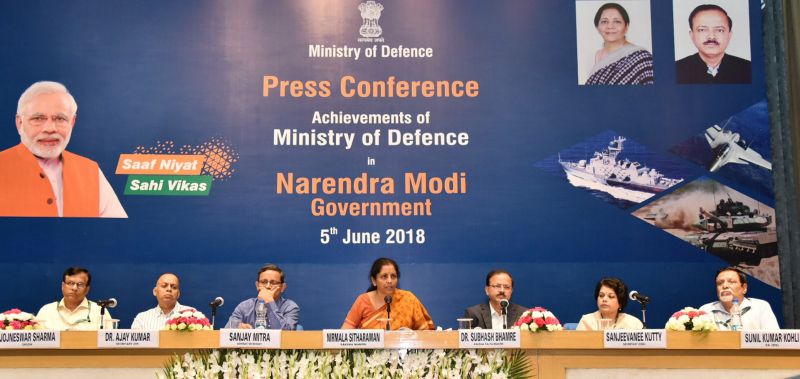MSMEs Seek Policy Changes for ‘Make in India’ to Happen
By R.Chandrakanth

The intent of the government at the Centre has been very clear – to aggressively indigenise the Indian defence industrial sector. But from ‘intent’ to ‘delivery’ there is a huge mismatch, primarily because the bureaucracy has been playing spoilsport. While the ‘Make in India’ initiative is a laudable one, at the ground level things are not moving as it should be to create a ‘defence industrial eco-system’. For instance, the micro, small and medium enterprises (MSME) segment, which forms a crucial cog in the wheel of indigenisation, invariably is thought of as an adjunct.
While we hear so much on how the MSMEs are going to be the backbone of the defence industry, there have not been commensurate efforts to bring them fully on board the entire eco-system. Policy level changes should happen here and now.
Without mincing any words, the Chairman of the MSME Defence Suppliers Group of FISME (Federation of Indian Micro and Small & Medium Enterprises) and the Managing Director of Pushpak Products India Pvt Ltd, Prakash Pushpak states “Make in India’ is a good initiative, but for the MSME sector it has remained mainly on paper.” With the government opening up the defence industrial sector for private players and also due to its indigenisation emphasis, the opportunities are plenty, but the challenges are even more. “Unless the officials understand the issues on the ground, the MSME sector will continue to struggle, living in an uncertain business environment.”
Order sustainability is a must
Adding further, Prakash said “sustainability is not there for MSMEs. For instance, I develop a product, investing substantially, and then the Defence PSU calls for tender where the L1 bags it, hence all my efforts of product development goes waste. There has to be a consistency of orders.” Standardisation of pricing is essential as under-quoting to bag an order does not help either the vendor or the Original Equipment Manufacturer (OEM and in the end there are cost overruns, delays etc.
MDSG linking units
Prakash mentioned further that the objective of the MSME Defence Suppliers Group is to link the existing and aspiring suppliers with the high value-added defence capital acquisition market. The particular focus of FISME has been to link MSMEs with the lucrative Make I and II initiative of the defence ministry under which projects up to Rs. 25 crore are reserved for MSMEs with government bearing the development costs.
The other challenges for MSMEs are finding skilled manpower, access to funding and not having a cluster-concept. Welcoming the work that is going on in the aerospace park in Bengaluru and the proposed defence industry production corridors (one in Tamil Nadu and the other in Uttar Pradesh), he said, the synergies of different units in the cluster would accelerate the development of a much needed ‘eco-system’ for defence production.
Defence production corridors to boost MSME activity
The Government has stated that the defence production corridor would provide an impetus to defence production in the country and promote regional development too. The corridor in Tamil Nadu will spur manufacturing in Chennai, Coimbatore, Trichy, Salem etc. As regards Bengaluru, it is already a hub of precision engineering and software development and a hotspot for defence suppliers, with a significant share of MSMEs. The heartening part is that over the last decade or so, the MSMEs have emerged as a dynamic sector and with the ‘Make in India’ programme the MSMEs are helping in shifting the focus away from the services sector to manufacturing.
There has to be a fair amount of handholding for MSMEs by some of the major defence units, both public and private. The public sector units are doing that but that we are told is not enough. For instance, Hindustan Aeronautics Limited has implemented the procurement policy for micro and small enterprises which extends facilities to MSEs such as the issuance of tender sets free of cost, exemption from payment of earnest money deposit (EMD), L1+15 per cent price preference and free registration for Startups.
The importance of MSMEs can be gauged from the fact that the Committee of Experts under the Chairmanship of Dhirendra Singh had in its report stated that almost 80 per cent of components, aggregates and assemblies of complex weapon systems and aircraft are made by MSMEs, which are part of supply chains. The report submitted in July 2015 put the number of MSMEs at nearly 6,000 then and in these three years the assumption is that the number has grown considerably with the ‘Make in India’ programme getting a massive push.
Expansion of vendor base
The Director, Planning and Coordination, Ministry of Defence, Ravin Kulshrestha said: “We are looking to increase our vendor base as self-reliance and indigenisation are crucial.” There was a call to all the MSMEs to take advantage of the policies and to start by ‘picking the low hanging fruits’. The Defence Research Development Organisation (DRDO) has opened up 26 technologies that the private sector can tap and commercialise.
The contribution of SMEs towards total domestic procurement from vendors by Ordnance Factory Board (OFB) and DPSUs has been encouraging, but it needs to be stepped up.
Domestic procurement from SMEs by OFB /DPSUs:-
Financial Year Procurement value (in crores of Rs.)
2014-15 Rs. 3301.17
2015-16 Rs. 3701.08
2016-17 Rs. 4256.93
To prop up the MSMEs the government has tweaked the DPP-2016 and they include:
* In ‘Make’ category of capital acquisition, Government funded projects with estimated cost of prototype development phase not exceeding Rs.10 crore and Industry funded projects with estimated cost of prototype development phase not exceeding Rs. 3 crore are reserved for MSMEs.
* It has been mandated to involve MSME associations while carrying out feasibility studies for ‘Make’ projects. MSMEs have also been granted relaxation in the registration and profitability criteria for consideration as eligible “Indian Vendor” for participation in the ‘Make’ projects.
* In the discharge of offset obligations, a multiplier of 1.50 will be permitted where MSMEs are Indian Offset Partners (IOPs).
The MSMEs have to quickly pick the low hanging fruits and get rolling. While efforts are on to create the eco-system, the MSMEs are still grappling with issues on how to break into the big budgeted defence market. They can break into, only if policies are further simplified and with a bit of hand-holding. This is likely to happen as the pace of ‘Make in India’ gathers momentum for which the thrust is expected from the MSMEs.
Author is a Bengaluru based independent journalist.



